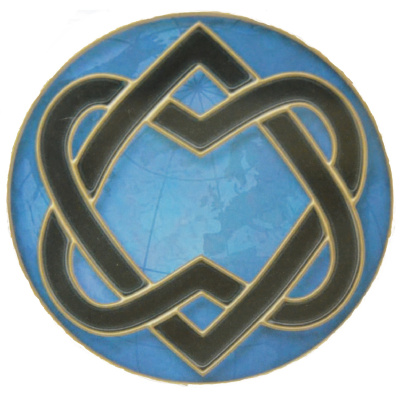Sinopse
Scholarly, Conservative Jewish Teachings on God, Prayer, Torah and Kabbalah with Rabbi Nadav Caine (ravnadav)
Episódios
-
What Brilliant American Hero Assimilated Like Joseph?
29/12/2022 Duração: 13minUsing the interpretations of the Rabbis (including Nachmanides and Sefer HaYashar) to understand Joseph's assimilation (in name, dress, etc.), I compare him to an American hero very recently in the news! I can't say more without ruining the suspense...
-
Achieving our Dreams while Living with Anxiety
20/12/2022 Duração: 17minYaakov's famous wrestling scene and renaming as Yisrael --one who wrestles with God and prevails-- is often understood as Yisrael wrestling with God as his opponent. The Rabbis point out how problematic this is, since the opponent is listed as a "man," not as God. Therefore some of the Rabbis see it this way: the wrestling opponent looks identical to Esav, being his guardian angel (Rashi) or his projection, and wrestling "with God" (im elohim) means wrestling with God as a supportive ally. Yaakov clearly is the Patriarch of Anxiety, and in this climax, we see a powerful message: one does not vanquish anxiety, but rather "one who prevails" is one who does what they love (say, acting, healing, teaching, parenting, etc.) while experiencing panic and anxiety at the same time. This is the powerful message which is both true according to science and according to Torah.
-
Eco-Burial and Jewish Law
20/11/2022 Duração: 18minIs it right to use arable land --often very expensive in populated areas -- for graves, then pollute the environment by keeping them "dignified" through maintenance and pesticides, with the hollow promise of "perpetual care," and say this is all required by Jewish Law, when Jewish Law itself is the source of the requirement for eco-decomposition and of prohibitions against costly burial? I explicate the sources using the Conservative Movement's oficial responsum, "Alternative Kevura Methods" by Rabbi Jeremy Kalmanofsky, which can be found at bit.ly/3tMa4RG
-
Listening Like It’s Shivah
10/11/2022 Duração: 10minIn this ten minute teaching I used to begin the 10 Days of Awe, I connect several teachings. The first is the Rabbinic teaching that following a calamity upon a village, one should try to give the luxury rations to those who are used to luxury because being unaccostomed to hardship, their anguish might be even greater than others' though we are tempted to believe the opposite. The second is that during Yom Kippur, we approach ourselves and our relationships in a state of aninut, of affliction -- the same word used when one has suffered calamity, and the same word used when one is burying a loved one and then heading into the week of shivah grieving. The third is that it is forbidden to say, "How are you?" to someone who has just experienced aninut, and instead one must practice a special form of active listening. Following two years of calamitous pandemic, where many of us put on brave faces because we are scared to share our emotions due to our perceived privilege or we may not have suffered as much as o
-
The Spiral of Progress/History
03/11/2022 Duração: 11minIs the Jewish concept of history that of linear progress, or that of Ecclesiastes' cyclical vanity? This teaching was delivered during a 12-Step friendly Serenity Shabbat.
-
Learning from 12 Step: The ”El Anon” Theology of the Exile Prophets
01/11/2022 Duração: 02minThe theology of the haftarot of the exile prophets like Deutero-Isaiah is hard for most people to relate to: "You are in exile, your life is full of tragedy, and I love you, I remember you as you were before, but I won't be getting you out of the situation you got yourself in, and which I warned you repeatedly about." This is the kind of "unloving" God that Christian theologians for millenia have accused Jews of having. Yet do those in Al-Anon understand it in a way they can teach us?
-
Those in 12 Step Recovery are Our Teachers (Rosh Hashanah Sermon 2022)
21/10/2022 Duração: 25minFor too long, Jews have associated the Recovery movement with Christianity, and we have seen those in recovery, or with addictions, as outsiders to Torah. This is far from reality. The main example of vows-of-change --the essence of High Holidays-- in the Torah itself is the vow to abstain from alcohol and other intoxicants, involving emulating priestly service and separating for a period from one's family and social triggers. The very process of High Holiday teshuvah is recognizing our wrong behavior, feeling bad about it, and then releasing that guilt feeling through doing a cheshbon nefesh --an accounting-- of exactly how we have harmed others and ourselves, then making amends, then embracing a different path, and then serving God and others. This is the teaching of 12 step. (Jewishly, the teshuvah steps are enumerated sometimes as 4, sometimes as 6, and sometimes as more steps, but they essentially mirror the 12 steps of recovery.) Whether the 12 Step Movement has roots in Christian founders is irrel
-
Chatter and Our Relationship with God through Our Relationship with Our Inner Voice
09/10/2022 Duração: 28minMy Yom Kippur sermon in 2022. Using Ethan Kross's book Chatter along with Jewish sources and my own observations about life, I challenge us to form our relationship to God through our relationship with our inner voice, which these days tends to be taken over by CHATTER, the stress brought on by the takeover of our inner God voice through the Satan voice. It's time we challenge it head on.
-
Moses the Mother in Transition (Ilana Kurshan’s Teaching)
28/08/2022 Duração: 13minI share Ilana Kurshan's teaching on rabbinic midrash seeing Moses as a mother in transition, as they question whether, at the promised land border, God's refusing his entry is frustrating his desire to mother the people more, or frustrating his desire to claim "his turn" to actually have a life now that the children are leaving the nest. I include my own glosses, but make no mistake that this is Ilana Kurshan's teaching.
-
Eikev and the Torah of Ambivalence
21/08/2022 Duração: 14minIn this d'var Torah, I discuss how parashat Eikev is the section of Torah most frought with ambivalences, from the text itself through the Rabbinic commentaries: blessing as bounty and overextension, independence and dependence, hardship and privilege, closeness and distance. I relate this to our lives directly in the examples of the college experience and of our relationship with God.
-
Ableism, Torah, and ”Greatness Comes from Being Lifted Up By Your Brothers”
22/05/2022 Duração: 09minHow do we relate to the Torah's insistence that the kohanim who do the major rituals be without blemish or disability? Isn't that grossly ableist? I suggest the following. First, the Torah is not an idealistic description of a utopia of saints -- it forces us to recognize truths about human nature, and then create a society for real people like us, so it forces us to recognize our own prejudices and ableism, which are also active today. Second, there is a serious issue at stake involving the Offerings of Damaged Goods, which is a massive problem in our society today --which tells us a lot about ourselves and how we give. And third, I use the commentator Bartenura's commentary to offer a way the tradition is accepting human nature but leading us to how to refine it into inclusivity.
-
Judaism and Abortion: The Process of the Decision IS Religion
10/05/2022 Duração: 12minIn this presentation, I present the Talmudic sources on Judaism's discussion of the status of the fetus, and I argue that what's been missing from the discussion --including the discussion of Jewish views -- is the fact that Judaism leaves open what the status of the fetus is between 40 days and full viability, but does importantly say that men have no say in it, and God transfers His authority to the prospective mother. In other words, the issue is not freedom of religion in the sense of one denomination versus another, but rather the freedom of the prospective mother to have her own relationship with God, as she possesses the authority to consider that in-between state of the fetus she carries, and what it means to her and to God as she makes her decision, and not let others tell her what it is or not. (One issue I wish I had made a bit clearer: around the 11 minute mark, I talk about the fact that Tractate Niddah specifies that between 40 and 80 days, the miscarriage is more than a normal period, and th
-
Believing in Miracles (or not) in 5 Minutes
19/04/2022 Duração: 05minOne of my "standing on one foot while answering a humungous theological question" podcasts. "Rabbi, what do we mean by miracles? What is up with the Red Sea splitting?" I give my on-one-foot 5 minute answer, but we should all go and study (as Hillel famously said after answering his on-one-foot answer) afterward. By the way, I refer to seeing a red butterfly in the answer: at a funeral and shivah I officiated at, it came up repeatedly that a butterfly would show up in their lives just at the time of remembering the widow's husband, who had a very special connection to butterflies.
-
Is the Wailing Wall an Orthodox Synagogue? The Kotel Agreement, Yuval Noah Harari and Anat Hoffman
18/03/2022 Duração: 21minAt the same time as the Torah turns its pages to describe the creation and pattern of the Temple, with men, women, and children mixed together, and the haftarah describes the construction of the Temple in Jerusalem as the same, the Israeli government reneges on the Kotel Agreement to provide a separate space for mixed gender worship near the Wailing Wall, even while turning over the Wall officially to ultra extremist fundamentalist Jews who claim that the inclusion of women --or women leading prayer in the women's section-- is a fundamental affront to the original pattern (which is a lie). In this presentation, I quote extensively from three sources: the Haaretz article from 2020 called "What Yuval Noah Harari Thinks About Women’s Fight for Equal Rights at the Western Wall," David Golinkin's 2011 article "Is the Entire Kotel Plaza Really a Synagogue?" and Rabbinical Assembly's 2022 "Statement on Non-Implementation of Kotel Agreement."
-
Self-Improvement, Judgment, and Seeing God’s Back
21/02/2022 Duração: 11minWhile Judaism demands that one does not judge oneself too harshly, nor live in a place of self-defeating criticism, nevertheless there's a vital role for self-judgment to play in our learning from the past to walk with God and expand our ability to channel holiness into the world. In fact, since God loves us as we are, and even provides a Shabbat that makes us feel that the world is made for us as we are, it is vital we judge ourselves, because that's not the job God wants, nor is it the job for others to do.
-
Clothing God? Sewing as an Act of Lovingkindness
14/02/2022 Duração: 11minThe Talmud tells us that the first great act of God's love (chesed, lovingkindness) was making clothing for Adam and his wife. Do we return the favor?
-
Does God Have a Plan for Us?
30/01/2022 Duração: 07minJoseph's dreams seem to predict the future and his role in it. So does God have a plan for us?
-
Lecture: Halakhic Sources, the Fetus, and the Morality of Abortion
17/01/2022 Duração: 48minThe source sheet I'm reading from is at: https://docs.google.com/document/d/1R0Txiy6QvQiHo40hKSsHyafLernFjS8tXp0tJo7gPWA/edit?usp=sharing This is a lecture to give the listener the Rabbinic sources that create distinctions and legal status for decisions around the criminalization of elective abortion, as discussed in the Supreme Court hearings.
-
Patriarchy, Gaze, Voice and Intersectionality? Exodus and bell hooks
28/12/2021 Duração: 22minHere I tease out the following ideas of bell hooks: 1. Our society valuing power over others as the paramount value, and rooted in the psychology of men. 2. This value playing out in drama as "the protagonist" as the center around which others must revolve, and often the only one whose name counts. 3. Oppositional gaze: the one who owns their justice perspective is the one who has the power to gaze at injustice [like Moses having the privilege to "gaze" at the taskmaster beating a Hebrew slave]. 4. Intersectional identity: our society tries to have our identities of oppression divided up -- say, of black, immigrant, poor, and woman-- because that plays into the system rather than seeing them all at once, at the "intersectionality" of our identites. 5. Finding our voice as loving ourselves enough to feel that we are fully ready to put that full loved identify forward, rather than perpetuating the system by finding ourselves falling short. 6. When we love ourselves, we can love others --meaning holding their ab
-
Joseph‘s Brothers and Robert Bly‘s The Sibling Society
22/12/2021 Duração: 14minRobert Bly, one of America's great poets and poetry translators, recently died. In this presentation, I apply Bly's books of social commentary to the end of Genesis. Iron John described the effects of fathers turning over parenting duties to others --like the wrong-headed "kids learn from interacting with other kids" rather than with parents. It also argued for the simultaneous absence of initiative rites in American society. In The Sibling Society, Bly argued that American society represents an adolescent stage of development, not true adulthood. I apply both books to the entire end of the Book of Genesis.
























